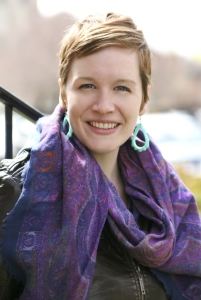Social Work Doctoral Student Spotlight: Improving outcomes for court-involved babies and toddlers

Tina Ann Dykehouse
Improving outcomes for court-involved babies and toddlers
Professional Biography
Tina's training, research, and practice experience centers on the psychosocial health and well-being of very young children. While earning her Bachelor of Arts in Psychology at Wayne State, she served as research assistant to Associate Professor of Psychology Marjorie Beeghly and to Ann Stacks, director of the Infant Mental Health Program at the university's Merrill Palmer Skillman Institute for Child & Family Development. While earning her M.S.W in Community Practice and Social Action from Wayne State, she worked as an infant mental health specialist with The Guidance Center in Southgate and worked under the program manager for Spaulding for Children's National Resource Center for Adoption in Southfield. From 2013 to 2015, Tina served as coordinator of the Wayne County Baby Court supporting interdisciplinary teams, assisting parents, and assessing the program's fidelity to the court team model. Tina, who has instructed M.S.W. students in quantitative analysis methods and practical methods of research presentation as a member of the School of Social Work's adjunct faculty, recently completed an internship with the Michigan Foster Care Review Board of the State Court Administrator's Office through Wayne State's Broadening Experiences in Scientific Training (BEST) program.
Research/Dissertation
Tina's dissertation will explore interdisciplinary collaboration within the context of Safe Babies Court Teams (SBCTs), a community engagement and systems-change initiative of the Zero To Three National Center for Infants, Toddlers, and Families. The initiative, which began in 2005 and has been replicated in multiple sites across the country, improves outcomes for very young children entering the child welfare system due to abuse or neglect by fostering collaboration between those making decisions about their care, specifically the presiding judge, child welfare staff, attorneys, service providers and other community leaders. Among other things, Safe Babies Court Teams make sure children receive a medical home, screenings for disabilities and development delays, maximum visitation time with their families, and a permanent placement as soon as possible. They also promote family reunification by providing child-parent psychotherapy and connecting parents with various forms of assistance, including education and job training and physical and behavioral health services. Through interviews with nearly three dozen SBCT professionals representing different agencies and professions, Tina will use grounded theory methodology to identify the activities, knowledge, skills, motivations, organizational supports and contextual factors that are necessary to interdisciplinary collaboration in SBCTs and will use that information to develop a theory of interdisciplinary collaboration within the SBCT context.
Why It's Important
Research shows that early exposure to trauma can shape the developing brain, having both immediate and lifelong impacts on health and well-being. At the same time, young children can recover from early maltreatment precisely because development happens rapidly and the growing brain can respond to new experiences. Unfortunately, 20% of very young children who are returned to their parents after foster care are re-referred for maltreatment within the first 18 months, and nearly half of these infants and toddlers re-enter the system. While SBCTs have shown great promise in preventing recidivism and providing appropriate and timely interventions to reverse damage to emotional, social, cognitive and language development, their ongoing success requires a more nuanced understanding of the factors responsible for these outcomes. With her dissertation, Tina will be develop a theory of interdisciplinary collaboration within SBCTs, which is arguably the most critical component of this promising model. As her advisor, Professor of Social Work Arlene Weisz, notes, Tina's dissertation "will delve into the actual processes that contribute to the success of SBCTs rather than merely showing they have good outcomes."
Faculty Support
Joining Weisz on Tina's dissertation committee are Assistant Social Work Professor Suzanne Brown, Associate Social Work Professor Debra Patterson, and Merrill Palmer's Stacks. Weisz describes Tina as an "excellent critical thinker" who is sensitive to the importance of respecting vulnerable and oppressed populations in the application of theories. One of three doctoral students who, with faculty support and university funding, organized a learning community for doctoral students to foster scholarly writing, Tina has garnered praise for her leadership abilities. "She brings tremendous passion to her work, which should enable her to make her research relevant, engaging, and useful to practitioners," Weisz said. "Her work fits extremely well with our school's goal to bridge the gap between research and practice."
To read about other social work doctoral students and the research they are pursuing, click here: http://socialwork.wayne.edu/phd/student-spotlight.php